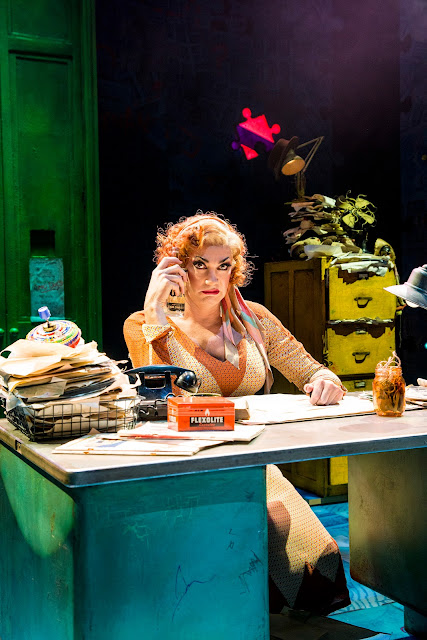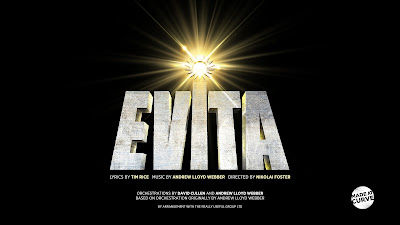Following two years of disruption
due to the pandemic, we seemed to get our theatre-going mojo back in 2022. We
finally saw Sara Bareilles’ musical Waitress,
a musical which was at ease with putting together the heartfelt and quirky as
it was with putting together bacon and blueberry in a pie. Frantic Assembly
demonstrated once again why they’re one of the most exciting theatre companies
today with their stripped-back, contemporary take on Othello. Jodie Comer had an unstoppable energy in Suzie Miller’s
one-woman play Prima Facie. And there
was a brilliant revival of Beautiful –The Carole King Musical at Leicester’s Curve, featuring the late Douglas
McGrath’s first-class book, perfectly capturing the New York vibe like a Neil Simon
comedy.
So, for what it’s worth, here’s our
Top 10 list in alphabetical order:
1. A Strange Loop – Lyceum, New York
Audacious in its form, style and
subject matter, A Strange Loop is a
mighty meta musical which balances its self-irreverence and emotional intensity
superbly. Like Hamilton, it’s the
sort of show you want to plonk in front of detractors of musicals to show them
the possibility of the form. This is a semi-autobiographical musical by a
black, gay man about a black, gay man writing a musical, about a black, gay man
writing a musical, and so on. Our leading man is an Usher at a popular Disney
Broadway show, and Jackson scatters many gags about audiences, show business
and generalised opinions on musical theatre (‘Have you seen Hamilton?’ generates eyerolls from Usher
and his parents’ insistence that he ask Scott Rudin to produce A Strange Loop garners titters from a
knowing audience). The show pulls no punches, and addresses uncomfortable
issues with humour and pathos.
2. Billy Elliot – Curve, Leicester
This summer, Curve created a
production which afforded Billy Elliot
both the immense spectacle and touching intimacy it deserves. Nikolai Foster’s
vision beautifully evoked a sense of community against a delicately balanced
backdrop of political and emotional turmoil. The image of Billy dancing alone,
dwarfed by the vast metallic tangle of the stage, was unexpectedly moving while
the group numbers were rousing yet prophetic in their ominousness. The revival came
at a time in history where Britain faces a similar state of economic and
political crisis. It admirably demonstrated the capacity of the arts to
truthfully reflect the cultural climate while transcending social, physical,
and linguistic boundaries to express both individual and collective anger,
grief and joy.
3. Cabaret – Kit Kat Klub at the Playhouse,
London
This version of Cabaret brought to light new aspects of
the musical. Rebecca Frecknall’s vision is relentless: we revel in decadence
while being cowed by the undercurrent of menace. The performances were
pitch-perfect and I anticipate this production will shape portrayals of these
characters for some time to come. In all, one of the greatest pieces of praise
I can offer is that I could see this production again and again and always find
something new to enjoy or think about.
4. Jerusalem – Apollo, London
I was 19 when I first saw Jez
Butterworth’s Jerusalem at the Apollo
in 2011. For me, it was the play that sparked a love for going to see plays. I
was lucky to get a £10 ticket that day but it didn’t surprise me to hear that
people were queuing around the block and camping overnight to get tickets. Jerusalem captured a sense of urgency I
hadn’t seen reflected elsewhere and hadn’t been able to articulate myself until
that point. It struck a chord for me and a generation of other young audience
members hungry to see it. Ian Rickson’s production returned to the Apollo this
year with all the vitality and urgency it had first time round. It’s testament
to the greatness of the play, so full of cultural and literary allusions, that
it brought about other reference points and gained new meanings since it was
first produced. By the end, the play has the audience believing in giants too.
5. Kimberly Akimbo – Booth, New York
David Lindsay-Abaire and Jeanine
Tesori’s Kimberly Akimbo is a
heart-warming, nourishing musical and a first-rate example of book and score
complementing each other beautifully. Like with his play Good People (2011), Lindsay-Abaire is interested in the promises
and rhetoric of the American Dream not being fully realised; characters with
imperfections and major flaws but with hopes, fears and good intentions buried
somewhere beneath the surface. And in the centre of the storm is Kimberly,
played with such authenticity by Tony Award-winning soprano Victoria Clark. Kimberly
is no ordinary teenager. Born with a disease that ages her body abnormally
quickly, we hear that most people with her condition only have a life
expectancy of about 17 years. We not only believe she’s 16 but her optimistic
outlook and bright spark in her eyes is endearing without ever being overly
sentimental. It’s destined to be the musical of the season and I’ll be rooting
for it at next year’s Tony’s.
6. Life of Pi – Wyndham’s, London
Lolita Chakrabarti adapted Yann
Martel’s ‘unadaptable’ novel Life of Pi
for Sheffield Theatres which we saw in the West End earlier this year. Telling
the story of Piscine Patel who survives a storm which capsizes the ship that
his family and their zoo were on, Life of
Pi is a remarkable achievement in epic storytelling. Its utter brilliance
comes from how it highlights that theatre is a truly collaborative artform: from
Tim Hatley’s set design to Nick Barnes & Finn Caldwell’s driftwood-style
puppets to Andrzej Goulding’s video design to the seven Olivier Award-winning
actors who played the tiger, all helmed by Max Webster’s production. Hatley’s
design cleverly reconfigures the Wyndham’s stage into more of a thrust similar to
Sheffield’s Crucible. The effect is that you find yourself moving in your seat
with the motion of the lifeboat. Also clever is how, just like theatre, imagination
and reality sit side by side, the sterile walls of the hospital existing in the same moment as the
deep blue of the ocean. It may be closing in January but a UK tour
and Broadway run start in 2023.
7. Rock/Paper/Scissors –
Crucible/Lyceum/Studio, Sheffield
All three plays in Chris Bush’s Rock/Paper/Scissors triptych ran in
Sheffield Theatres’ three spaces simultaneously with one cast. The overall
piece was a logistical coup-de-théâtre. It was also a perfect coming together
of space and place in three funny, achingly profound and heartful plays about a
city and its people on the cusp of change. Set in present-day Sheffield across
three locations of a former scissor factory, the plays explored the various
stakeholders who all have a claim on what they’d like the space to be. From a
nightclub or industrial chic making hub, to flats, to carrying on as a working
factory, Rock/Paper/Scissors delved
into the spaces and lives that make up the past, present and future of Sheffield.
8. Spring Awakening – Almeida, London
Rupert Goold rejected much of the
whimsy of the original Broadway and London productions of Steven Sater and
Duncan Sheik’s musical in favour of a starker exploration of the purgatory of
adolescence, in which the characters are trapped within a childhood dictated by
unfeeling adults. Spring Awakening
may seem to be full of despair – and, to be fair, in our current political and
social climate it’s difficult not to agree with such nihilistic sentiments –
but the musical is not bereft of hope. In one of musical theatre’s most
beautiful finales we were reminded that life continues, generations will grow,
learn and prosper, and the pains endured in the pursuit of maturity are all
threads in the rich tapestry of life. Yes, the plot is hard-hitting and
damning, but we can all learn a thing or two about hope, change and empathy by
looking to the past in remembrance of the future. This was a stunning
production of a timely musical.
9. Tammy Faye – Almeida, London
Theatre lovers have whispered
rumours for years about Elton John’s long-awaited Tammy Faye musical. Following
the success of the recent Oscar-winning film based on the Televangelist’s life,
audiences’ appetites had been well and truly whetted. The world of Tammy Faye
Bakker is a marvel, and we’re encouraged to gawp and titter at the bizarre
fantasy land on display, but the jokes are never mean and the action is
peppered with a pathos that reminds us that these are real people and real
events. John and Shears have written some cracking torch songs for their
heroine, namely the Act One finale ‘Empty Hands’ and the empowering ballad ‘If
You Came to See Me Cry’. Katie Brayben excelled during these moments, pouring
her heart out and giving her all in a performance that is bound to garner many
nominations come awards season.
10. The Piano Lesson – Ethel Barrymore, New
York
One of the
classiest revivals we saw this year was LaTanya Richardson Jackson’s production
of August Wilson’s Pulitzer Prize winning The
Piano Lesson (1987). One of Wilson’s Pittsburgh cycle of ten plays which
chart the African American experience throughout the twentieth century, The Piano Lesson is set in 1936. Like in
Two Trains Running which we saw in
Northampton in 2019, Wilson’s dense text interweaves strands of prosaic gossip,
banter, song and urban myth. But this family drama is also haunted by a
spectral presence symbolic of America’s past as much as the Charles family’s. Beowulf
Boritt’s set fills the stage with the Charles’ house, several floors and wooden
beams go up to the roof, and an ornately carved piano dominates the living
room. What makes Richardson Jackson’s production rich with texture are the
superlative performances. Samuel L. Jackson as former railroad worker Doaker has
an earthy quality and jovial bond with the others, but the standout performances
belong to John David Washington as Doaker’s nephew Boy Willie and Michael Potts
as Doaker’s brother. There’s an ease and authenticity among the cast which
really sets the play alight. It concludes its limited run on 29th
January, 2023 but there are rumours of a London transfer.
 |
From Left to Right:
|
Billy
Elliot: Jaden Shentall-Lee. Credit: Marc Brenner
A
Strange Loop: Jaquel Spivey. Credit: Marc J. Franklin
Jerusalem:
Mark Rylance. Credit: Simon Annand
The Piano Lesson: Samuel L. Jackson. Credit: Julieta Cervantes
Life
of Pi: The Tiger and Nuwan Hugh Perera. Credit: Ellie Kurttz |







